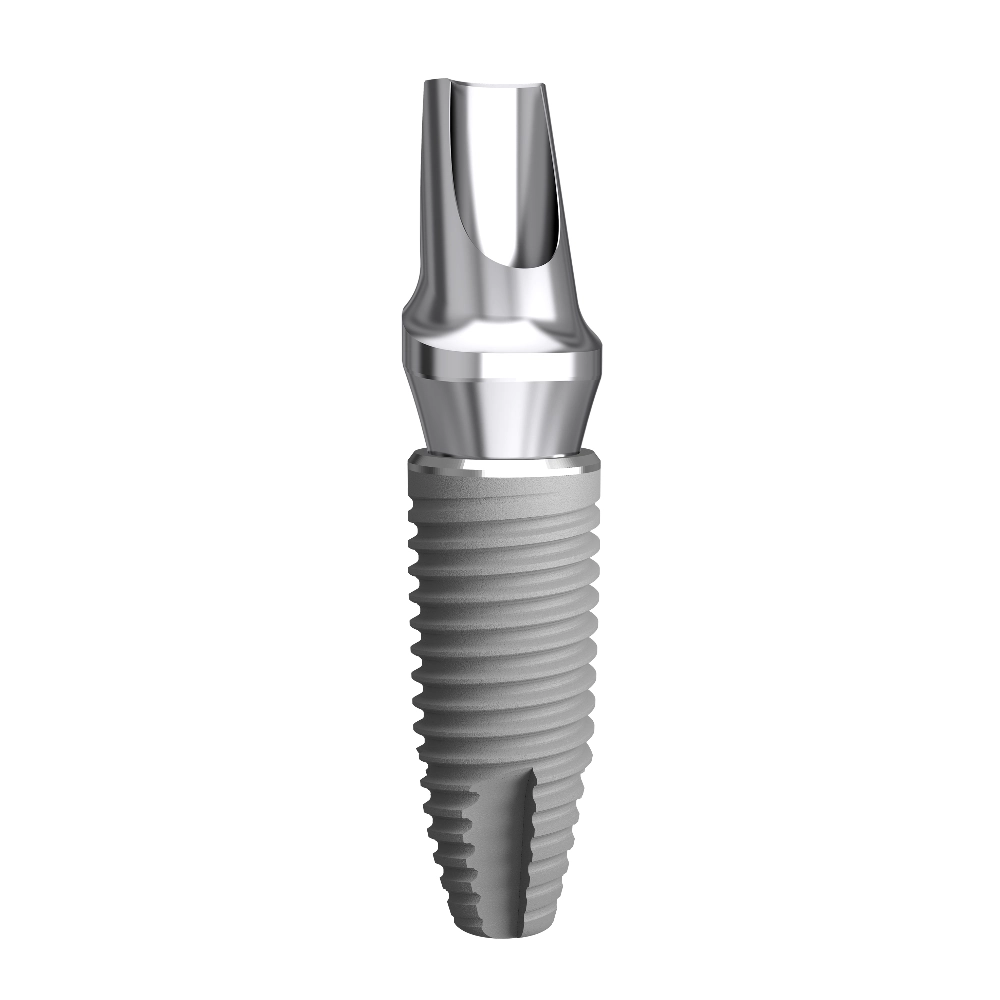Vous envisagez de poser des implants dentaires ? Si les implants dentaires peuvent constituer une option intéressante pour de nombreuses personnes, ils ne conviennent pas à tout le monde. Pour savoir si les implants en valent la peine, il faut procéder à une évaluation complète à partir de plusieurs points de vue. Notre analyse détaillée des avantages et des inconvénients des implants dentaires, ainsi qu'une discussion sur les caractéristiques démographiques des patients, peuvent aider à déterminer si les implants sont le bon choix pour vous. Voyons cela de plus près !

La valeur des implants dentaires se reflète dans cinq aspects clés.
1. apparence et sensation naturelles
L'un des principaux avantages des implants dentaires est leur simulation naturelle inégalée, qui se reflète à la fois dans l'apparence et la sensation.
En termes d'apparence, les implants dentaires utilisent des matériaux et des techniques de restauration orale avancés pour imiter avec précision la couleur, la forme et l'éclat des dents naturelles. Qu'il s'agisse de la ligne du sourire des dents antérieures ou des surfaces de mastication des dents postérieures, les implants peuvent se fondre harmonieusement avec les dents existantes du patient, réalisant une transition naturelle presque imperceptible. Ce haut niveau de réalisme améliore non seulement le résultat esthétique, mais renforce également la confiance des patients dans les situations sociales, leur permettant de s'engager sans s'inquiéter des problèmes dentaires qui affectent leur image.
Les implants dentaires sont tout aussi impressionnants sur le plan de la sensation. Grâce à des techniques chirurgicales précises, les implants peuvent s'ancrer solidement dans l'os de la mâchoire du patient, formant ainsi une structure de soutien stable et durable. Cette base solide garantit aux patients un confort identique à celui des dents naturelles, qu'il s'agisse de mâcher, de parler ou de sourire. Ils ne ressentent pratiquement aucune sensation étrangère, comme si leurs dents n'avaient jamais manqué. Cette combinaison de beauté et de praticité fait des implants dentaires un choix idéal pour les patients à la recherche d'une santé bucco-dentaire de qualité et d'une meilleure qualité de vie.
La simulation naturelle des implants dentaires n'est pas seulement évidente dans leur apparence exquise, mais aussi dans le confort qu'ils procurent. Cet avantage exceptionnel place les implants dentaires au premier rang des restaurations dentaires modernes, apportant santé, beauté et confiance à d'innombrables sourires.
2. Améliorer son image et sa confiance en soi
Vous pouvez hésiter à sourire en public s'il vous manque des dents, mais les implants dentaires constituent une solution fiable pour retrouver un sourire plein d'assurance. À long terme, le fait de prendre soin de vos implants dentaires peut renforcer votre confiance et prolonger leur durée de vie.
Avec un entretien et des soins appropriés, les implants dentaires peuvent atteindre une stabilité plus durable que les prothèses dentaires, qui doivent être remplacées tous les cinq à dix ans. Parce qu'ils sont insérés directement dans l'os de la mâchoire, ils ont non seulement une longue durée de vie, mais ils offrent également une stabilité et un soutien supérieurs. Cette fonction permet aux patients de vivre une expérience plus confortable en évitant d'endommager l'os de la mâchoire ou les dents voisines.
Il est également important de noter que l'emplacement de l'implant dans la mandibule favorise le développement de l'os. Cet impact physiologique renforce encore la durabilité de l'implant et constitue une base solide pour son utilisation à long terme. Par conséquent, les implants dentaires sont un choix populaire pour améliorer l'estime de soi et la confiance en soi, en plus d'être une technique de pointe pour restaurer la fonction bucco-dentaire.
3. Manger et mastiquer avec facilité
Il peut devenir très difficile de mâcher avec des prothèses dentaires qui ne sont pas correctement ajustées. En revanche, comme les implants dentaires se comportent comme de vraies dents, vous pouvez manger facilement et sans difficulté.
La fonction première des dents est de broyer et de mâcher les aliments ; l'exécution efficace de cette fonction repose sur la coordination et l'équilibre parfaits de plusieurs tissus buccaux, allant de la langue et des lèvres aux dents et aux gencives. Cet équilibre délicat sera rompu si les dents sont enlevées, ce qui rendra la mastication précise difficile, voire impossible. Cet équilibre dans la bouche est rétabli avec succès par la technologie des implants dentaires, qui remplissent avec précision les espaces laissés par les dents perdues.
Les implants dentaires se distinguent des autres solutions de remplacement des dents par le fait qu'ils peuvent remplacer toute la structure de la dent, y compris la partie essentielle de la racine. Le plus évident des nombreux avantages pratiques de cette caractéristique est la facilité avec laquelle la mastication est facilitée. La mastication devient plus difficile à mesure que les dents tombent, car le tissu de l'os de la mâchoire qui soutient les dents se détériore progressivement et les dents voisines se déplacent. En préservant l'intégrité de l'os de la mâchoire et en fournissant un nouveau support radiculaire aux dents de remplacement, les implants dentaires parviennent à prévenir cette cascade d'événements, garantissant ainsi une fonction de mastication continue et efficace.
4. Une ligne de défense solide pour la mâchoire
Parmi les nombreux avantages des implants dentaires, il en est un qui ne peut être négligé : leur capacité à stopper la perte de l'os de la mâchoire. Les implants dentaires ont la capacité de s'intégrer profondément dans l'os de la mâchoire, ce qui est crucial pour maintenir la santé osseuse, contrairement aux options de remplacement des dents qui sont simplement posées à la surface des gencives (comme les bridges ou les prothèses conventionnelles). Il inhibe avec succès la détérioration de l'os tout en favorisant le développement osseux. Par rapport aux autres options de remplacement des dents, les personnes qui choisissent les implants dentaires ont un risque considérablement réduit de perte osseuse, selon des études fiables.
La perte de l'os de la mâchoire est un grave problème de santé bucco-dentaire dont les effets peuvent être importants et profonds. Elle ne peut être négligée. Le déclin de la santé osseuse peut entraîner la perte d'autres dents et avoir un impact négatif sur la structure du visage, ce qui peut altérer l'apparence d'une personne. Dans les cas les plus graves, ce problème peut compromettre considérablement la capacité d'une personne à parler et à manger régulièrement, réduisant ainsi sa qualité de vie. Par conséquent, en raison de leurs avantages particuliers, les implants dentaires sont aujourd'hui une option populaire pour préserver la santé bucco-dentaire et stopper la perte osseuse.
5. Un traitement d'implant dentaire abordable et efficace
Les implants dentaires permanents sont très pratiques par rapport aux prothèses dentaires, qui doivent être enlevées régulièrement ou maintenues en place à l'aide d'adhésifs. Cette fonction facilite non seulement l'hygiène dentaire quotidienne, mais améliore également l'expérience du patient.
Les implants dentaires nécessitent les mêmes soins que les vraies dents. Il suffit de se brosser les dents et d'utiliser du fil dentaire pour maintenir une cavité buccale saine et propre. Outre le gain de temps et d'efforts, l'absence d'adhésifs ou de solutions de nettoyage spécifiques réduit également le risque de problèmes de santé bucco-dentaire liés à une utilisation incorrecte. Les patients peuvent donc bénéficier d'un sourire durable et attrayant grâce aux implants dentaires, qui nécessitent moins d'entretien en raison de leurs procédures de soins simples et efficaces qui garantissent des résultats constants et un grand statut.
Qui peut recevoir des implants dentaires ?
Pour la plupart des personnes en excellente santé, les implants dentaires constituent une technique de réhabilitation orale sophistiquée. Les conditions fondamentales pour recevoir des implants dentaires sont les suivantes :
- Un os de la mâchoire suffisant pour fixer l'implant : L'efficacité des implants dentaires dépend de la présence d'un os maxillaire suffisant et de gencives saines. L'os de la mâchoire du patient doit être suffisamment sain et avoir suffisamment d'os pour que les implants puissent y être posés et fournir un support solide.
- Une bonne hygiène buccale : L'entretien des implants dentaires dépend en grande partie de la propreté de la bouche. Pour réduire le risque d'infection, les patients doivent avoir une bonne hygiène bucco-dentaire avant et après l'opération.
- Absence de pathologies coexistantes telles qu'un diabète non traité ou une hypertension artérielle : Les taux de réussite des implants dentaires peuvent être affectés par des affections de longue durée telles que le diabète et l'hypertension. Par conséquent, les patients doivent s'assurer que ces affections sont bien contrôlées avant l'opération et qu'elles restent stables après celle-ci.
- Éviter de fumer excessivement : Le tabac contient des composés toxiques qui peuvent perturber la santé bucco-dentaire et interférer avec la fusion des implants avec les os de la mâchoire, ce qui augmente le risque d'échec des implants dentaires.
- Patients diabétiques : Alors que les recommandations précédentes déconseillaient aux diabétiques de se faire poser des implants dentaires, les lignes directrices les plus récentes indiquent que les diabétiques peuvent se faire poser des implants dentaires à condition que leur taux de glycémie soit bien contrôlé. Pour garantir le succès de l'intervention, les patients doivent toutefois consulter un médecin avant l'intervention pour vérifier si leur état de santé le permet et surveiller attentivement leur taux de glycémie après l'intervention.
Les patients doivent consulter un dentiste qualifié ou un expert en implantologie orale avant d'opter pour des implants dentaires. En fonction de la situation unique de chaque patient, notamment de sa santé bucco-dentaire, de son état de santé général et de ses besoins personnels, le dentiste déterminera s'il est un bon candidat à la chirurgie d'implantation dentaire et lui proposera un traitement sur mesure.
Processus d'implantation dentaire
- Évaluation et examen préopératoires : Avant la pose d'un implant dentaire, il est nécessaire de procéder à un examen bucco-dentaire approfondi et à une évaluation de la santé systémique. Il s'agit notamment d'obtenir des tomographies ou des radiographies panoramiques orales, d'évaluer l'état des tissus dentaires, de déterminer la densité de l'os alvéolaire et d'établir s'il existe des maladies bucco-dentaires. Afin de s'assurer que le patient ne présente pas de contre-indications, telles que des maladies cardiaques, cérébrovasculaires ou des infections transmises par le sang, des mesures de la tension artérielle, de la glycémie, de la fonction de coagulation, etc. sont effectuées simultanément. Sur la base de ces résultats, un plan d'implantation dentaire personnalisé est établi.
- Préparation préopératoire et pose de l'implant : Après l'administration d'un anesthésique local et un nettoyage minutieux du site chirurgical, le médecin pratique des incisions dans les gencives pour révéler l'os alvéolaire et y percer un trou adéquat. Afin de garantir que l'implant artificiel est en contact étroit avec l'os alvéolaire, il est ensuite placé dans le trou. Dans un environnement fermé, les gencives sont finalement suturées pour terminer l'intégration osseuse de l'implant.
- Cicatrisation des tissus et insertion de la couronne : Après l'implantation d'un implant, l'intégration osseuse stable entre l'implant et l'os alvéolaire nécessite un certain temps (souvent 3 à 6 mois). Afin de favoriser la production de tissus mous, le chirurgien va tailler les gencives, révéler l'implant et mettre en place une fondation de cicatrisation après la phase d'intégration osseuse. Pour garantir la stabilité, le confort et la beauté, la base de cicatrisation sera retirée après la croissance des tissus mous, et une couronne assortie à l'implant sera fabriquée et posée.
- Soins de suivi et examens de routine: Après la pose d'implants dentaires, les patients doivent pratiquer une bonne hygiène bucco-dentaire en se brossant régulièrement les dents et en utilisant du fil dentaire, et en s'abstenant de mordre sur des objets durs. Afin de garantir le taux de réussite des implants et de prolonger leur durée de vie, ils doivent également se rendre régulièrement à l'hôpital pour des examens de contrôle afin de surveiller l'état des implants et de résoudre rapidement tout problème.
Répercussions de la perte de dents
La perte de dents a de nombreux effets sur la santé bucco-dentaire et générale, en plus de l'apparence. Elle entraîne des problèmes immédiats pour manger et parler clairement au quotidien. Elle peut également déclencher une réaction en chaîne comprenant une détérioration progressive de l'os de la mâchoire et un risque élevé de maladie des gencives.
Il est donc essentiel de choisir un dentiste ayant reçu la formation nécessaire à la pose d'implants dentaires pour garantir la réussite de l'intervention et les résultats à long terme. Il est important de tenir compte de la réputation d'un dentiste lors de la recherche d'un professionnel, car les avantages de cet investissement compenseront largement les efforts déployés. En outre, choisissez des implants de qualité supérieure. Implants DentalMaster sont composés de titane de première qualité travaillé à froid. L'utilisation à long terme des implants dentaires est soutenue par une fusion osseuse plus rapide rendue possible par la thérapie SLA.
Veillez à effectuer des recherches approfondies et à consulter votre dentiste avant d'opter pour des implants dentaires ou tout autre type d'opération dentaire. Vous ferez ainsi preuve de considération pour vos dents inestimables et votre sourire attachant. Votre sourire confiant et votre santé dentaire valent la peine que nous les protégions avec prudence !
Conclusion
Les implants ont une valeur significative dans la restauration de la fonction orale, la restauration esthétique, le maintien de la santé bucco-dentaire, l'amélioration de la qualité de vie et la stabilité à long terme. Cependant, la chirurgie des implants dentaires exige également que les patients remplissent certaines conditions, telles que des gencives saines, un os suffisant pour fixer les implants et une bonne hygiène bucco-dentaire. Lors du choix des implants dentaires, les patients doivent consulter un dentiste professionnel et prendre des décisions en fonction de leur propre situation.








